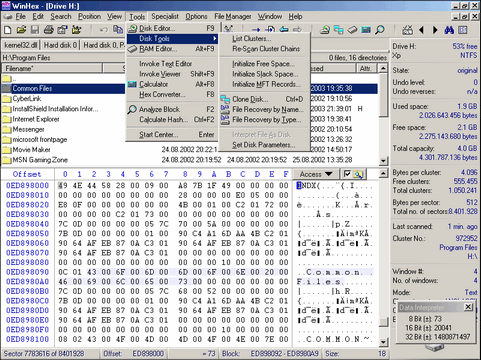 X-Ways Software Technology heeft versie 15.5 van WinHex uitgebracht. WinHex is niet alleen een universele hexeditor, maar is ook in staat om low-level dataprocessing toe te passen via een makkelijke interface. Het programma beschikt onder meer over een ram-editor, een data-interpreter en een disk-editor, en kan bijvoorbeeld worden gebruikt om verwijderde informatie terug te halen en om bestanden te inspecteren. WinHex werkt op alle Windows-versies vanaf Windows 2000 en is verkrijgbaar in vier verschillende versies met prijzen vanaf veertig euro. Het changelog van deze release laat de volgende veranderingen en verbeteringen zien:
X-Ways Software Technology heeft versie 15.5 van WinHex uitgebracht. WinHex is niet alleen een universele hexeditor, maar is ook in staat om low-level dataprocessing toe te passen via een makkelijke interface. Het programma beschikt onder meer over een ram-editor, een data-interpreter en een disk-editor, en kan bijvoorbeeld worden gebruikt om verwijderde informatie terug te halen en om bestanden te inspecteren. WinHex werkt op alle Windows-versies vanaf Windows 2000 en is verkrijgbaar in vier verschillende versies met prijzen vanaf veertig euro. Het changelog van deze release laat de volgende veranderingen en verbeteringen zien:
What's new?
- New e-mail extraction function for Outlook PST and OST e-mail archives (still testing). Ability to recover deleted e-mail messages if they can still be found. More information extracted from contact entries, calendar entries, and tasks stored in PST archives. Ability to process encrypted PST archives without the password. Faster processing than before. Outlook/MAPI installation not needed.
Plain text e-mail messages are presented as text files, HTML e-mail messages as HTML files. They are all marked as extracted e-mail messages in the Attribute column. E-mail headers are presented as child objects. This new kind of representation may still change.
Known problems: Non-English e-mails extracted with the new method at the moment might be displayed based on an incorrect code page. (For plaintext e-mail messages with this problem it should help to set the code page of the viewer component to UTF-8 to get non-English characters right.) Certain signed e-mail messages cannot be extracted.
Comments about this new feature are welcome. The old PST processing via MAPI is still available optionally if you check the "MAPI" checkbox.- The HTML registry report is now output completely in tabular form, for much better readability and import into other programs such as MS Excel for further processing (sorting, filtering). Comments about this new format are welcome. The name and key of each value is not output explicitly any more by the default, but can be seen in as a tooltip when moving the mouse cursor over a small white box. If you need to see the name and key explicitly for each and every reported value for some reason, you can include it optionally via the registry viewer's context menu.
- The second part of the registry report now gives an overview of installed drivers, file systems, and services in addition to the very helpful tables "Attached devices by serial number" and "Partitions by disk signature".
- The Details Panel has been renamed to Info Pane in the English user interface, to avoid confusion with Details mode.
- The index optimization now fully utilizes the memory space advantages 64-bit Windows environments.
- X-Ways Forensics has been found to run on Windows 7 just as well as under Windows Vista, i.e. the same limitations (but no additional limitations) apply.
- Ability to distinguish between DOCX, XLSC, PPTX, and other file types when running a file header signature search.
- Various minor improvements.


:fill(white):strip_exif()/i/2000568959.jpeg?f=thumbmedium)